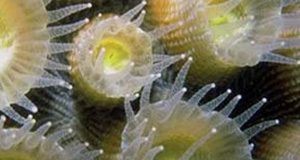Abstract
Corals are small animals related to jellyfish. Large groups of these animals live together and form huge interconnected colonies called reefs. Coral reefs are some of the most diverse ecosystems on the planet; an essential habitat for a wide variety of animal and plant species. About 400 million people rely on coral reef fish as a source of protein; about 6 million people make a living by catching and selling coral reef fish and invertebrates; tourism activities like SCUBA diving and snorkeling provide revenue of US $9.6 billion per year; and reefs reduce wave energy by 97%, helping to protect 197 million people in coastal areas from beach erosion, wave energy, and flooding. Learn how you can help protect these fragile, essential ecosystems from threats in this 7-page fact sheet written by Kathryn E. Lohr and Joshua T. Patterson, and published by the Program in Fisheries and Aquatic Sciences, School of Forest Resources and Conservation, September 2016.
FA199/FA199: Coral Reef Conservation Strategies for Everyone (ufl.edu)
References
Baker, A. 2014. "Climate Change: Many Ways to Beat the Heat for Reef Corals." Curr. Biol. 24, R1166-R1168. https://doi.org/10.1016/j.cub.2014.11.014
Barnes, D. K. A., F. Galgani, R. C. Thompson, and M. Barlaz. 2009. "Accumulation and fragmentation of plastic debris in global environments." Philos. Trans. R. Soc. Lond. B. Biol. Sci. 364, 1985-1998. https://doi.org/10.1098/rstb.2008.0205
Camp, E., and D. Fraser. 2012. "Influence of conservation education dive briefings as a management tool on the timing and nature of recreational SCUBA diving impacts on coral reefs." Ocean Coast. Manag. 61, 30-37. https://doi.org/10.1016/j.ocecoaman.2012.02.002
Cesar, H., L. Burke, and L. Pet-Soede. 2003. The Economics of Worldwide Coral Reef Degradation. Cesar Environmental Economics Consulting, Arnhem.
Chase, N. 2041. Significant fuel economy improvement options exist for light-duty gasoline vehicles. U.S. Department of Energy, Washington, D.C..
Cinner, J. 2014. "Coral reef livelihoods." Curr. Opin. Environ. Sustain. 7, 65-71. https://doi.org/10.1016/j.cosust.2013.11.025
Escobedo, F., J. A. Seitz, and W. Zipperer. 2009. The Effect of Gainesville's Urban Trees on Energy Use of Residential Buildings. Gainesville: University of Florida Institute of Food and Agricultural Sciences. edis.ifas.ufl.edu/FR273.
Fabina, N. S., M. L. Baskett, and K. Gross. 2015. "The differential effects of increasing frequency and magnitude of extreme events on coral populations." Ecol. Appl. 25, 1534-1545. https://doi.org/10.1890/14-0273.1
Ferrario, F., M. W. Beck, C. D. Storlazzi, F. Micheli, C. C. Shepard, and L. Airoldi . 2014. "The effectiveness of coral reefs for coastal hazard risk reduction and adaptation." Nat. Commun. 5, 1-9. https://doi.org/10.1038/ncomms4794
Francini-Filho, R. B., and R. L. Moura. 2008. "Evidence for spillover of reef fishes from a no-take marine reserve: An evaluation using the before-after control-impact (BACI) approach." Fish. Res. 93, 346-356. https://doi.org/10.1016/j.fishres.2008.06.011
Harrison, H. B., D. H. Williamson, R. D. Evans, G. R. Almany et al. 2012. "Larval Export from Marine Reserves and the Recruitment Benefit for Fish and Fisheries." Curr. Biol. 22, 1023-1028. https://doi.org/10.1016/j.cub.2012.04.008
Hoegh-Guldberg, O. 1999. "Climate change, coral bleaching and the future of the world's coral reefs." Mar. Freshw. Res. 50, 839-866. https://doi.org/10.1071/MF99078
Hoegh-Guldberg, O., P. J. Mumby, A. J. Hooten, R. S. Steneck, P. Greenfield, E. Gomez, C. D. Harvell, et al. 2007. "Coral reefs under rapid climate change and ocean acidification." Science 318, 1737-1742. https://doi.org/10.1126/science.1152509
Jackson, J., M. Donovan, K. Cramer, and V. Lam (eds). 2014. Status and Trends of Caribbean Coral Reefs: 1970-2012. Global Coral Reef Monitoring Network, IUCN, Gland.
Jambeck, J. R., R. Geyer, C. Wilcox, T. R. Siegler, M. Perryman, A. Andrady, R. Narayan, and K. L. Law. 2015. "Plastic waste inputs from land into the ocean." Science 347, 768-771. https://doi.org/10.1126/science.1260352
Johns, G., C. Kelble, D. Lee, V. Leeworthy, and W. K. Nuttle. 2013. Ecosystem Services Provided by the South Florida Coastal Marine Ecosystem. MARES Whitepaper: Ecosystem Services.
NOAA. 2015. "What is a marine protected area?" Natl. Ocean Serv. at http://oceanservice.noaa.gov/facts/mpa.html
Natural Resources Defense Council. 2007. Food miles: How far your food travels has serious consequences for your health and the climate. New York. https://food-hub.org/files/resources/Food%20Miles.pdf
Pandolfi, J. M. 2003. "Global Trajectories of the Long-Term Decline of Coral Reef Ecosystems." Science 301, 955-958. https://doi.org/10.1126/science.1085706
Raven, J., K. Caldeira, H. Elderfield, O. Hoegh-Guldberg, P. Liss, U. Riebesell, J. Shepherd, C. Turley, and A. Watson. 2005. Ocean acidification due to increasing atmospheric carbon dioxide. The Royal Society: London.
Sabine, C., R. A. Feely, N. Gruber, R. M. Key, J. L. Bullister, R. Wanninkhof, et al. 2004. "The Oceanic Sink for Anthropogenic CO2." Science 305, 367-371. https://doi.org/10.1126/science.1097403
Sutherland, K. P., S. Shaban, J. L. Joyner, J. W. Porter, and E. K. Lipp. 2010. "Human sewage identified as likely source of white pox disease of the threatened Caribbean elkhorn coral, Acropora palmata." Environ. Microbiol. 12, 1122-1131. https://doi.org/10.1111/j.1462-2920.2010.02152.x
Wilkinson, C. 1998. "The 1997-1998 Mass Bleaching Event Around the World." In: Status of Coral Reefs of the World, 1998. Global Coral Reef Monitoring Network, Australian Institute of Marine Science, Townsville.

